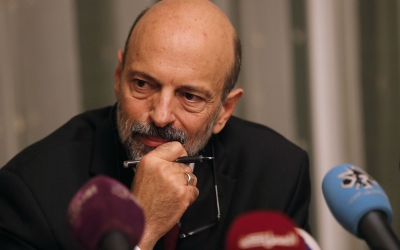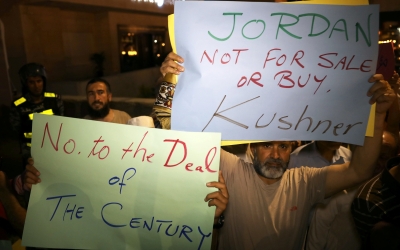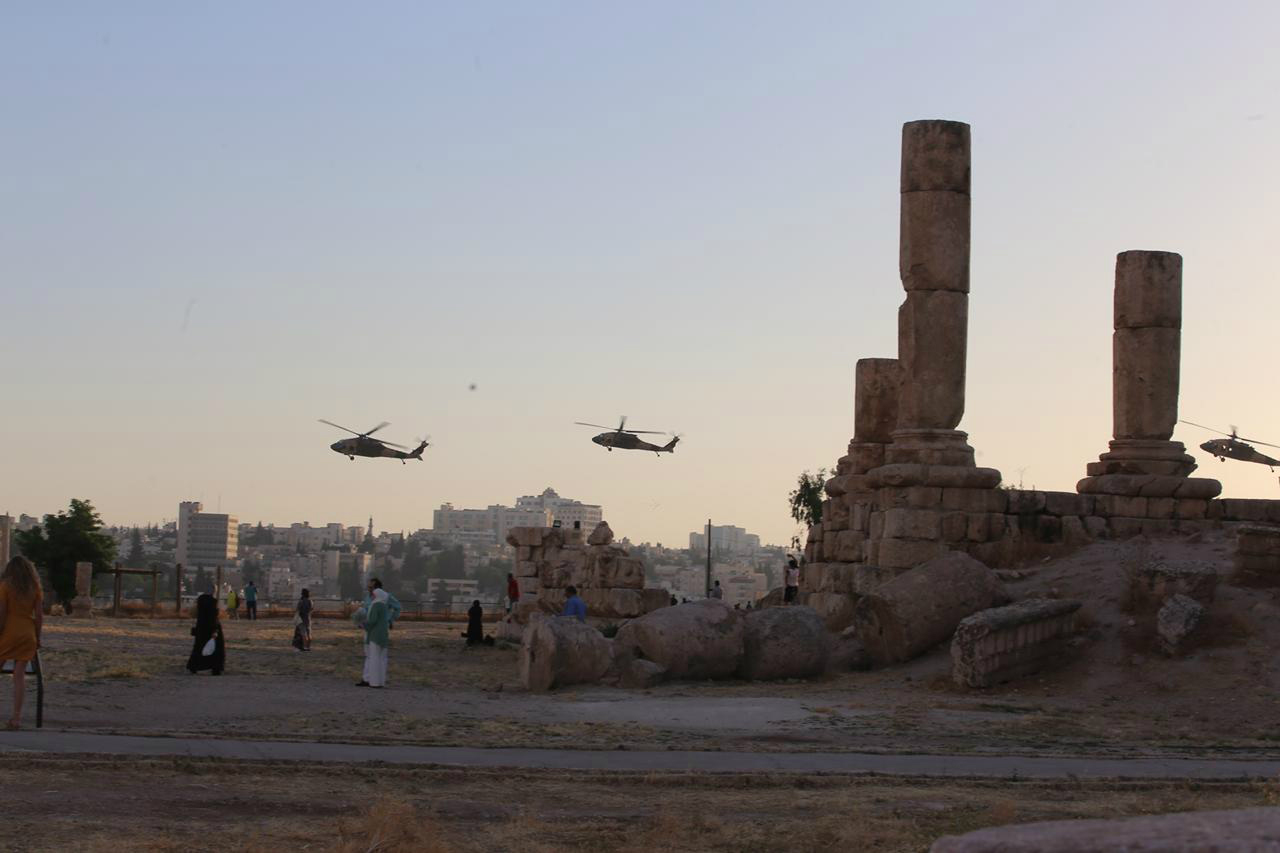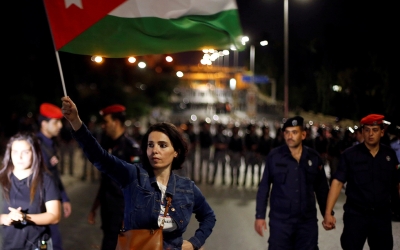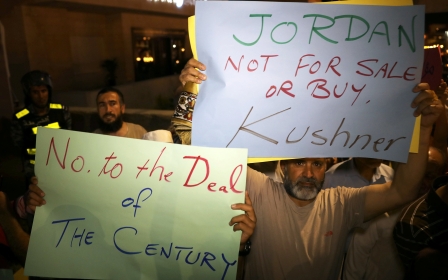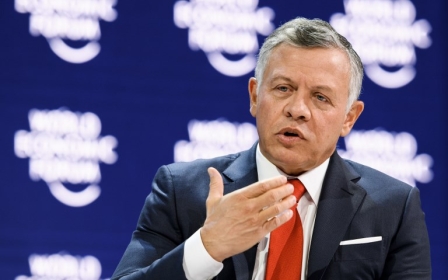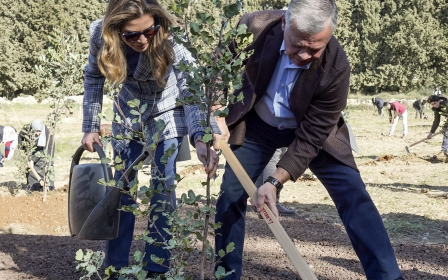After 20 years of rule, Jordan's King Abdullah stands on shaky ground
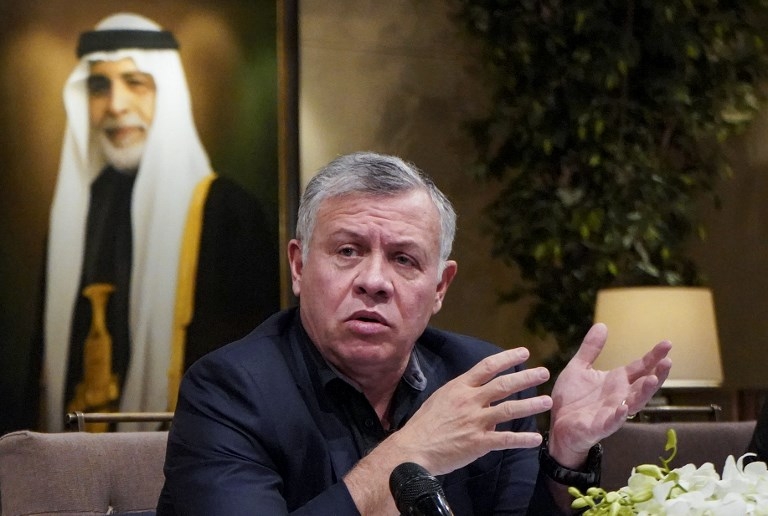
Jordanians celebrated the 20th anniversary of King Abdullah II's ascension to the throne on Sunday, a period of rule that has not been easy.
Authorities organised events under the title "we are all King Abdullah" as a sign of solidarity with the king as he stands up to pressure over the Palestinian cause.
Last September, the king described that pressure as both "on Jordan and on him personally".
Abdullah became king on 9 June 1999, after the death of his father King Hussein bin Talal, one of the most experienced leaders both in domestic and foreign affairs.
The young king faced several regional challenges, beginning with the occupation of Iraq in 2003 and its effects on Jordan, followed by the "Arab Spring" revolutions, and the war in Syria which saw huge numbers of Syrian refugees entering the kingdom.
New MEE newsletter: Jerusalem Dispatch
Sign up to get the latest insights and analysis on Israel-Palestine, alongside Turkey Unpacked and other MEE newsletters
On the domestic front, the country's economic challenges have produced an army of unemployed, some of whom held a sit-in outside the king's palace in February.
New wave of the Arab spring
Two decades of the king's reign have seen a series of political crises, and growing unrest.
The biggest of these challenges has been the difficult economic situation, which continues as Jordanians participate in a new wave of protests springing up across the region, which the government has had to bend to in order to placate.
In addition to the internal issues, Jordan has had to deal with regional tensions that have shaken Jordan's traditional alliances.
Sabri Rbeihat, the former minister of political development and culture, told Middle East Eye that under the king "Jordan succeeded in dealing with the economic and security challenges, coupled with the political challenges that the Arab region, including Jordan, had to face".
"Jordan kept its stability but without making major accomplishments for a variety of internal and external reasons," he said.
"Among the biggest has been the traditional allies which Jordan used to work with, and for which it was repaid piecemeal for its role.
"In other words, there were no strategic allies that Jordan was able to hold serious cooperation with, or to carry out programmes that had strategic results. So, for Jordan it was a strategy of presence and continuity."
Most recently, Jordan has found itself under intense pressure from all sides as the United States prepares to roll out its "deal of the century" Israel-Palestine peace plan.
Amman has reportedly been sidelined for much of Washington's preparatory work, and has reluctantly agreed to attend a summit in Bahrain later this month that the Trump administration hopes will launch the economic package designed to be an incentive to the Palestinians to cooperate.
Rbeihat believes that what happened with the Palestinian issue is "troubling and has forced the kingdom to revisit its alliances, whether with the US or Israel, both of whom began looking for other allies [and] bypassing Jordan".
Weakening of traditional alliances
Political analyst Labib Kamhawi told MEE that on accession to the throne the "first challenge facing the king was staying and succeeding".
"He was not ready or prepared for the challenges he was facing and it was hard to fill the shoes and the political role that his father had played in the region."
According to Kamhawi: "The regime didn't succeed in political development in Jordan because its vision of political reform was different from what the people wanted.
"This led to popular movements rising up and demanding political reform and elected governments, as well as growing complaints by the youth who were unhappy with the absence of economic and political reform, and the absence of job opportunities."
On the regional level, Kamhawi believes that "Jordan dealt in a gradual way with the collapse of traditional alliances".
"The Hashemite alliance with Saudi began to weaken as Jordan was asked to take up the Saudi position over Syria, the Yemen crisis and Iran," he said.
"This was seen as being contrary to the interests of Jordan and therefore the alliance began to weaken. Jordan in the meantime failed to create new alliances instead of these traditional ones.
"The US alliance may have not weakened, but it is placing Jordan under unbearable pressure because of the visible American bias towards Israel with the aim of ending Palestinian national aspirations.
"The king has weathered earlier pressures when the US recognised Jerusalem as Israel's capital and when it attempted to end the right of return by defunding UNRWA.
"But the continued pressure on Jordan has become a dangerous challenge to a governing authority that is unable to agree with it, but at the same time can't oppose it."
For its part, Jordan has warned repeatedly of the dangers of the Trump administration's "deal of the century" and its ramifications.
Last March, the king made his position regarding Jerusalem very clear despite the pressures, stressing three nos, namely: No to denial of return for refugees, no to a truncated Palestinian homeland, and no to making concessions on Jerusalem.
Economic challenges
Internally, the challenges facing the king are no less than the regional ones. According to Kamhawi, the plan to privatise public institutions has helped destroy Jordan’s economy.
Unemployment has reached 18.6 percent while inflation has risen as a result of a 3.7 percent tax on basic commodities, mainly consisting of fuel.
Jordan's debt at the end of July 2018 was $39bn, which is 96.4 percent of gross national product.
The numbers are a major cause of concern for the king, who told the New York Times in March that he stays awake at night thinking of the unemployment problem among the country's youth.
The country's economic problems greatly increased when the government entered into what is commonly referred to as the "economic correction phase" which has been implemented by the International Monetary Fund (IMF) since 1989, after a difficult economic crisis at the time.
This programme has been the reference point for the economic plans of all successive governments which applied its measures in order to receive low-interest loans.
As a result, the government has raised prices on basic commodities and applies a number of taxes, while at the same time privatising public institutions, which many Jordanians consider a policy of extraction and poverty.
'Jordan is strong and steadfast'
Abla Abu Elba, the secretary-general of the left-wing People's Democratic Party, said that "Jordan didn't move to a productive economy as many had hoped, and as a result it is tied to loans with international institutions like the IMF".
"This has had a big effect on people's livelihoods and the economy, in a country that has to tax the people and raise prices in order to pay the interest on these loans," she said.
Abu Elba told MEE that Jordan overcame the biggest challenge to the king's rule when revolts swept through the Arab world in 2011 and produced the fall of many regimes.
"As a result, Jordan had to respond to the popular calls of the protesters by instituting limited reform," she said.
Jordan's government admits it faces challenges but points out that it has overcome them in the past.
Prime Minister Omar Razzaz tweeted on Sunday that "our challenges were, and are, big but our determination is strong".
Meanwhile, government spokeswoman Jumana Ghneimat tweeted: "Jordan is strong and steadfast with a wise leadership and a great people. This duality created miracles and we have been able to overcome challenges and difficulties."
This article is available in French on Middle East Eye French edition.
Middle East Eye delivers independent and unrivalled coverage and analysis of the Middle East, North Africa and beyond. To learn more about republishing this content and the associated fees, please fill out this form. More about MEE can be found here.


